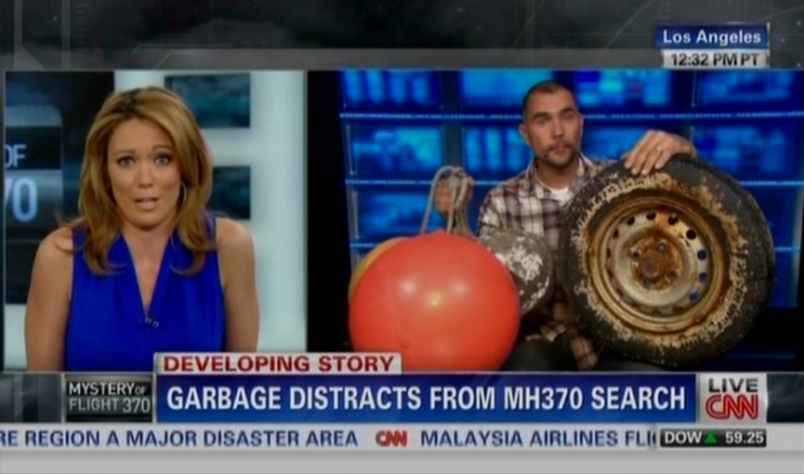In its wall-to-wall coverage of the disappearance of Malaysia Airlines Flight 370, CNN has raised the possibility of the supernatural, blackholes, and North Korea; it has interviewed a psychic, tried but failed to rent its own 777 jet, and finally settled on a flight simulator it is using to “search” for the plane.
On Tuesday the network finally turned its attention to garbage.
To be more precise, CNN noted the difficulty investigators were encountering following numerous leads, broadcast continually by the network as “breaking news,” that ended up being nothing more than ocean junk.
Marcus Eriksen, the Executive Director of 5 Gyres Institute, brought on props to explain how the search for possible debris was complicated by the fact that the world’s oceans contain “five gyres,” rotating ocean currents that attract junk.
“Is there any way to distinguish between a tire and a piece of a floating cushion, let’s say, from a plane?” host Brooke Baldwin asked.
“I think not until you get down to the water’s surface,” Eriksen said. “A satellite image might not have the resolution to discern a peace of luggage from a buoy or a truck tire. But once you’re down there on the ocean’s surface, you begin to see the kind of debris that’s out there.”
Baldwin then took the opportunity to get to the real subject at hand. The missing plane wasn’t the story, she said, but rather pollution.
“That’s what I wanted to get to, because I feel like accidentally, it’s this ocean junk that’s really been spotlighted because of this horrific mystery,” she said. “But what’s being done with the trash? Is anyone’s government taking any kind of responsibility, helping?”
“Well, what’s happening is we’re seeing a change, we’re seeing producer responsibility happen,” Eriksen responded. “And that is when you make a product, think about the back end of it. Like what happens to the stuff we consume and throw away? Where is away? We’re finding away is our oceans. When you make a product, if it’s for a single use throw away application, maybe plastic isn’t the best material. So we’re seeing companies change, and some governments are reacting to it.”
Watch:






